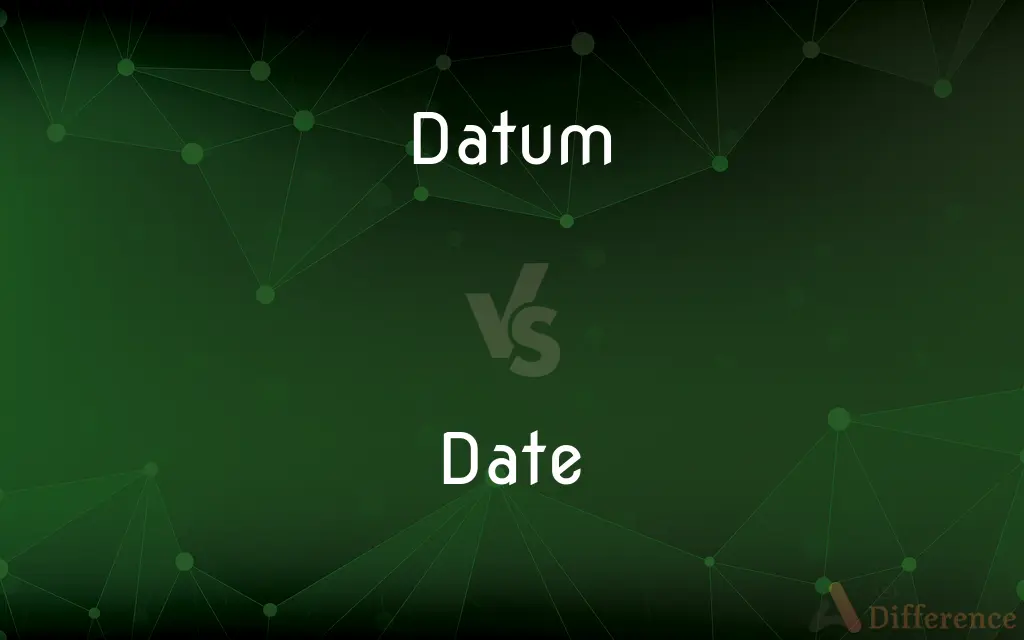Datum vs. Date — What's the Difference?
By Tayyaba Rehman & Maham Liaqat — Updated on March 6, 2024
Datum refers to a single piece of information, while date signifies a specific day in a calendar.

Difference Between Datum and Date
Table of Contents
ADVERTISEMENT
Key Differences
A datum is a singular term for data, representing a singular piece of factual information used as a basis for reasoning, discussion, or calculation. This information can be numerical, textual, or in any other form that contributes to a larger set of data. On the other hand, a date refers specifically to a point in time, typically a day, month, and year, used for scheduling events, historical records, and timekeeping. Dates are a universal way to organize time and events across different cultures and systems.
While a datum can be any fact or figure without temporal constraints, a date is inherently tied to the concept of time. The role of a datum is to provide a basis for analysis, research, or information processing, contributing to a broader understanding or decision-making process. Conversely, a date serves as a reference point in time, essential for planning, documentation, and commemoration.
Data (plural of datum) is crucial in fields such as science, finance, and technology, where accurate and reliable information is needed for analysis, prediction, and decision-making. Dates, however, are vital in everyday life, business, and history, helping in organizing schedules, deadlines, appointments, and historical timelines.
The accuracy of a datum is vital for the integrity of research, analytics, and information systems. It must be precise, relevant, and verifiable. Accuracy in dates is equally important but focuses on correct representation of calendar time, adherence to time zones, and observance of daylight saving changes where applicable.
The collection and management of data involve methods like surveys, experiments, and observation, emphasizing the importance of quality and context of each datum. Date management, however, revolves around calendars, timekeeping devices, and scheduling tools, emphasizing the organization and synchronization of events in time.
ADVERTISEMENT
Comparison Chart
Definition
A single piece of information.
A specific day in a calendar.
Primary Use
Basis for reasoning, discussion, or calculation.
Scheduling events, historical records, timekeeping.
Relation
Can be any fact or figure.
Tied to the concept of time.
Field of Application
Science, finance, technology.
Everyday life, business, history.
Importance
Accuracy and reliability for analysis.
Correct representation of calendar time.
Compare with Definitions
Datum
A single piece of factual information.
The datum showing the temperature was crucial for the climate study.
Date
A point in time specific to an event.
The date of the independence declaration is a national holiday.
Datum
An element in statistical analysis.
Each datum was analyzed to predict market trends.
Date
An appointment or social engagement.
They went on a date to the cinema.
Datum
A point of reference in mapping.
The map's accuracy depends on the chosen datum.
Date
A notation of time for historical events.
The date 1066 AD marks the Battle of Hastings.
Datum
A reference point in geodesy.
The GPS coordinates are based on the WGS 84 datum.
Date
The shelf life or expiration period of products.
Check the date on the milk to ensure it's fresh.
Datum
A basis for calculations.
The datum in the engineer's report determined the bridge's load capacity.
Date
A specific day in a calendar.
The date of the meeting is set for March 15th.
Datum
A single piece of information; a fact; especially a piece of information obtained by observation or experiment; - used mostly in the plural.
Date
The time stated in terms of the day, month, and year
What is the date of your birth?.
Datum
The quantities or relations which are assumed to be given in any problem.
Date
A statement of calendar time, as on a document.
Datum
An item of factual information derived from measurement or research
Date
A particular point or period of time at which something happened or existed, or is expected to happen
The date of their wedding.
Date
The time during which something lasts; duration
"Summer's lease hath all too short a date" (Shakespeare).
Date
Stamp with a date;
The package is dated November 24
Date
Provide with a dateline; mark with a date;
She wrote the letter on Monday but she dated it Saturday so as not to reveal that she procrastinated
Common Curiosities
What is the difference between datum and data?
Datum is singular, referring to one piece of information, while data is the plural form, referring to multiple pieces of information.
How is a date different from a simple day or time?
A date includes not just the day but often the month and year, providing a specific point in time, while a day or time could be more general.
Can a date be considered a datum?
Yes, a date can be considered a datum when it serves as a piece of factual information used in analysis or decision-making.
How are dates used in historical studies?
Dates are used to mark and organize historical events, allowing for a chronological understanding of history.
Why is the accuracy of a datum important?
The accuracy of a datum is crucial for ensuring the reliability of conclusions drawn from data analysis, research, or calculations.
Can the importance of dates vary culturally?
Yes, different cultures may place varying levels of importance on certain dates due to religious, historical, or cultural significance.
Why is datum important in data analysis?
Each datum contributes to the dataset's overall quality, influencing the analysis's accuracy and reliability.
What is a reference datum in geodesy?
It's a reference from which measurements are made, used in mapping and GPS technologies to provide accurate locations on Earth.
How do dates help in project management?
Dates are essential for setting deadlines, planning milestones, and organizing the timeline of a project.
How are dates standardized across different regions?
Dates are standardized through the use of calendars such as the Gregorian calendar, and international standards like ISO 8601.
What role does a datum play in scientific research?
A datum serves as a foundational piece of information that supports hypotheses, analysis, and conclusions in research.
What is the significance of leap years in dating?
Leap years adjust the calendar year to align with the Earth's orbital period around the sun, ensuring that dates remain accurate over time.
How is the accuracy of dates ensured in digital systems?
Digital systems rely on standardized time protocols and regular synchronization with time servers to ensure date accuracy.
How do businesses use dates?
Businesses use dates for planning, scheduling meetings, deadlines, financial reporting, and product expiration tracking.
Can a date be used for scientific measurements?
Yes, dates are crucial for recording the timing of observations, experiments, and phenomena in science.
Share Your Discovery

Previous Comparison
Bronchitis vs. Croup
Next Comparison
Fallowing vs. FollowingAuthor Spotlight
Written by
Tayyaba RehmanTayyaba Rehman is a distinguished writer, currently serving as a primary contributor to askdifference.com. As a researcher in semantics and etymology, Tayyaba's passion for the complexity of languages and their distinctions has found a perfect home on the platform. Tayyaba delves into the intricacies of language, distinguishing between commonly confused words and phrases, thereby providing clarity for readers worldwide.
Co-written by
Maham Liaqat














































